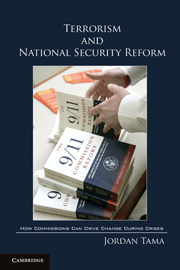Book contents
- Frontmatter
- Contents
- List of Figures and Tables
- Acknowledgments
- 1 Commissioning Reform
- PART ONE PATTERNS OF COMMISSION INFLUENCE
- PART TWO COMMISSIONS AND COUNTERTERRORISM POLICY
- PART THREE CONCLUSION
- 7 Implications and the Effort to End the Iraq War
- Appendix A Construction of the Data Set
- Appendix B National Security Commissions, 1981–2006
- Appendix C List of People Interviewed
- References
- Index
7 - Implications and the Effort to End the Iraq War
Published online by Cambridge University Press: 05 June 2012
- Frontmatter
- Contents
- List of Figures and Tables
- Acknowledgments
- 1 Commissioning Reform
- PART ONE PATTERNS OF COMMISSION INFLUENCE
- PART TWO COMMISSIONS AND COUNTERTERRORISM POLICY
- PART THREE CONCLUSION
- 7 Implications and the Effort to End the Iraq War
- Appendix A Construction of the Data Set
- Appendix B National Security Commissions, 1981–2006
- Appendix C List of People Interviewed
- References
- Index
Summary
The conventional wisdom is that commissions rarely lead to changes in government policies. I have found that the conventional wisdom is correct concerning one set of panels, but wrong with respect to another. Commissions formed to advance an agenda in the absence of a crisis tend not to trigger change because the status quo in Washington is very difficult to overturn. In the wake of a crisis, however, commissions often use their distinctive political credibility to induce the adoption of important reforms. Crisis commissions, it turns out, are not just devices used by elected officials to deflect political pressure or avoid unwanted action; they are also underappreciated and powerful tools for making public policy.
In the preceding chapters, I tested my theory of commission influence by investigating the impact of all fifty-one national security panels that reported between 1981 and 2006. The results of statistical tests supported my hypotheses that panels are more likely to influence policy if they are formed in response to a crisis; established by the executive branch, instead of Congress; or given a relatively narrow mandate.
I supplemented that statistical analysis with case studies of commissions that examined instances and threats of terrorism. These case studies revealed that commissions have frequently driven key elements of the U.S. response to terrorism, sparking or influencing major policy changes by providing a focal point for reform.
- Type
- Chapter
- Information
- Terrorism and National Security ReformHow Commissions Can Drive Change During Crises, pp. 181 - 196Publisher: Cambridge University PressPrint publication year: 2011



